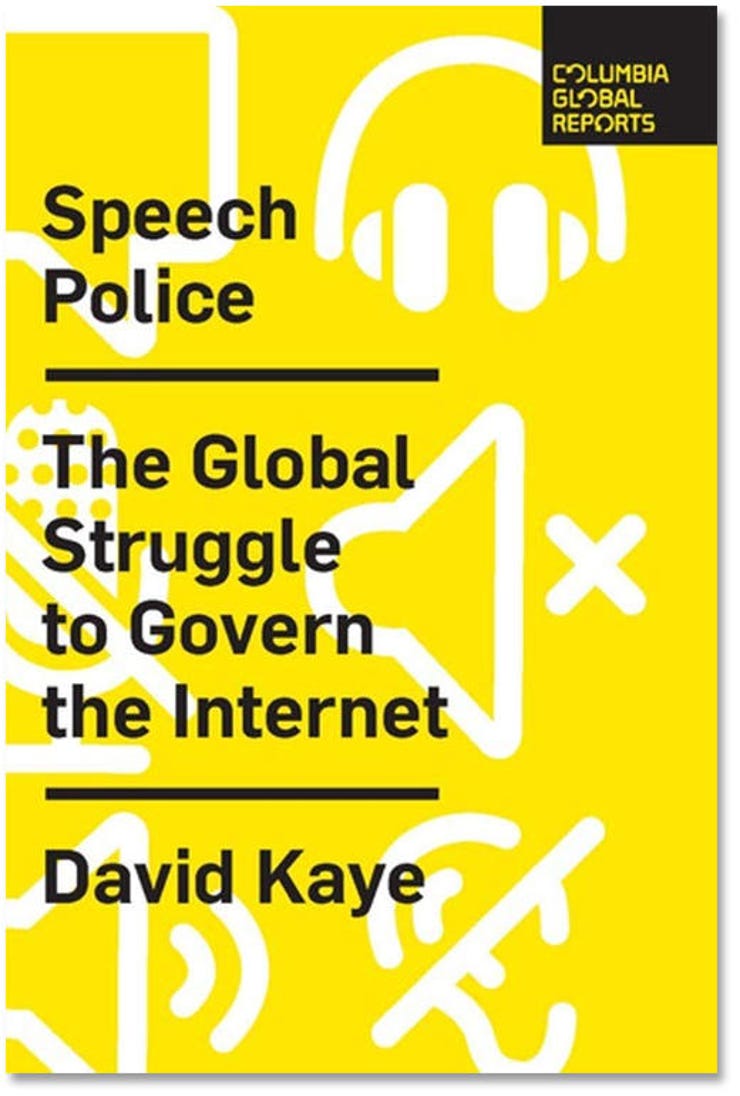Speech Police, book review: How to regain a democratic paradise lost


Speech Police: The Global Struggle to Govern the Internet • By David Kaye • Columbia Global Reports • 122 pages • ISBN: 978-0-99978454-8-9 • $15.99
"Who's in charge?" DG-CONNECT head Roberto Viola asked David Kaye. The question, at least as it relates to the internet, is perennial. To the best of my knowledge, it was first asked by John Connolly as the first National Science Foundation backbone was being built, and it's been asked repeatedly ever since by everyone from despairing governments to frustrated telco executives to civil society activists.
Most of us would say that the answer is, as it always has been, everyone and no-one. In Speech Police: The Global Struggle to Govern the Internet, however, Kaye leans into exploring it because it urgently requires an answer -- first because of the many familiar problems spreading through social media, and second because whoever does manage to take charge will wield enormous power. "Democratic governance is essential," he writes.
Kaye, who is a law professor at UC Irvine and the United Nations Special Rapporteur for Freedom of Opinion and Expression, is primarily interested in answering the question by finding a balance between the human right of free speech and the legitimate need to curb disinformation and abuse. Should it be the province of governments, the big platforms, or...well, who?
SEE: 60 ways to get the most value from your big data initiatives (free PDF)
Every answer has its problems: put governments in control, and you have the kind of censorship the US First Amendment bans; hand it off to the technology companies, as the UK government appears to propose in the Online Harms white paper, and you turn (largely foreign) private companies into the arbiters of cultural standards.
The big mistake, Kaye argues, is that we're essentially starting with a list of things we don't like. In 2017, when The Guardian got hold of a copy of the rules Facebook moderators use to decide whether a particular piece of content should be allowed to remain on its site, we got a close look at that crazy-quilt approach. From studies of how the various platforms' raters work -- for example, Sarah T. Roberts' 2019 Behind the Screen -- it's reasonable to surmise that similar documents and rulesets guide those who make similar decisions for YouTube, Twitter, Instagram, and other social media.
Nuanced decisions
Kaye favours a different approach: guiding principles that provide the flexibility to make nuanced decisions in individual cases. If you simply say, "delete all child nudity", you hit the headlines for censoring history when you suspend a journalist for posting the iconic photograph of Kim Phúc fleeing a napalm attack. If you then patch the rule to say, "delete all child nudity except this one photograph" eventually you wind up with a ruleset full of contradictions and exceptions that will be too complex for humans to apply.
Kaye is helpfully specific and sensible. We need to recognise context: Facebook is the only avenue for information and free speech in some places, but a vector for damage in others. Opting out of it is an affordable luxury in countries where there are choices and democratic values, but impossible in many others. Eventually, he concludes, we will have to decide "who's in charge?" -- preferably in a way that allows us to return, at least somewhat, to the idea of the open, democratic space with which the internet was originally founded.
RECENT AND RELATED CONTENT
Kaspersky speaks on US government ban and a closed Russian internet
Singapore university to establish facility that studies social impact of internet
The decline of social media: Facebook and Twitter leave us wanting
Facebook has a new tool to spot spammers, and it's already taken down billions of accounts
Read more book reviews
- Nano Comes to Life, book review: Small steps towards a giant leap
- Defending democracy in a post-truth world filled with AI, VR and deepfakes
- Holiday reading roundup: Five books to inform, educate and entertain
- Ghost Work and Behind the Screen, book reviews: Lifting the veil on the internet's secret employment sector
- Fire, Ice and Physics, book review: The facts behind the fantasy